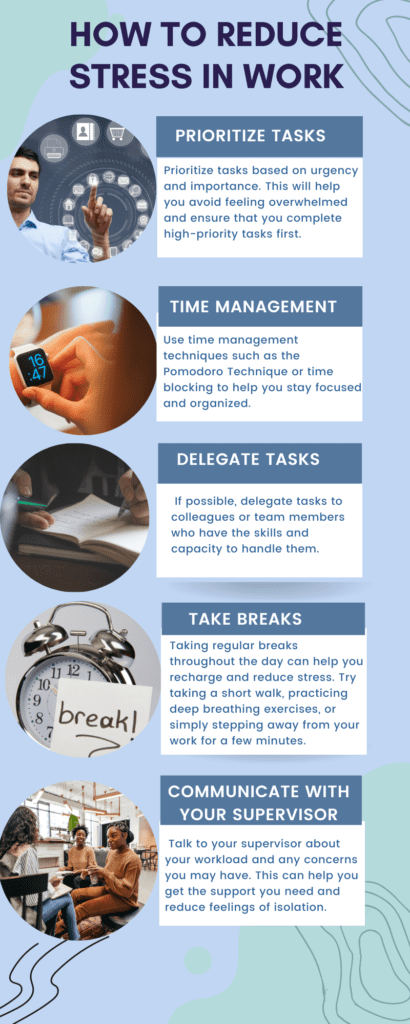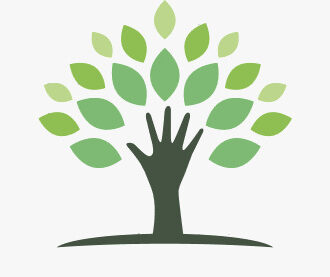In today’s fast-paced and highly competitive work environment, stress is almost an inevitable part of our lives. Whether it’s tight deadlines, heavy workloads, or constant pressure to perform, stress can take a toll on our mental and physical health, and ultimately affect our performance at work. However, there are strategies that can help us navigate work stress and improve our performance. In this article, we’ll discuss some of the most effective ways to deal with work stress and stay productive.
Prioritize and Plan
One of the most effective ways to manage work stress is to prioritize and plan. When you have a lot of tasks on your plate, it can be overwhelming, and you may not know where to start. However, if you prioritize your tasks and make a plan, you’ll be able to focus on the most important tasks and avoid feeling overwhelmed.
Start by making a to-do list of all the tasks that you need to complete. Then, identify the most important tasks and prioritize them accordingly. Finally, make a plan to complete these tasks, setting realistic deadlines and breaking down complex tasks into smaller, more manageable steps.
Prioritizing and planning are essential skills that can help you manage your time and tasks more effectively. Here are some points to consider when it comes to prioritizing and planning:
- Identify your goals: Before you start prioritizing and planning, it’s important to identify your goals.
- Make a to-do list: Once you have identified your goals, make a to-do list of the tasks that you need to complete to achieve those goals.
Prioritize your tasks: Not all tasks are created equal, so it’s important to prioritize them based on their importance and urgency. Identify the tasks that are critical and need to be done first.
- Set cutoff times: You can keep yourself motivated and focused by setting deadlines. Make sure you set realistic deadlines for each task on your to-do list.
- Schedule your tasks: Once you have prioritized your tasks and set deadlines, it’s time to schedule them. Use a planner or a scheduling app to allocate time for each task.
Concentrate on one thing at a time: Concentrate solely on one task at a time because multitasking can be detrimental. Before moving on to the next one, finish the first one.
- Review and adjust your plan: Review your progress regularly and adjust your plan as needed. Be flexible and adapt to changes in your schedule or priorities. By prioritizing and planning your tasks, you can be more productive and achieve your goals more efficiently.
Take Breaks
It’s important to take breaks throughout the workday to help manage stress and improve productivity. Taking a break can help you recharge, clear your mind, and return to work with renewed focus and energy.
Consider taking a short walk, meditating, or engaging in some other form of relaxation during your break. It’s also important to take regular breaks throughout the day, rather than trying to work for long periods without a break.

Practice Mindfulness
The practice of mindfulness involves paying attention to the present without judging. Practicing mindfulness can help reduce stress and improve focus and productivity.
To practice mindfulness, try focusing on your breath, body sensations, or your surroundings. When your mind starts to wander, gently bring your focus back to your breath or whatever you’re focusing on.
- Mindfulness is the practice of being present at the moment, without judgment or distraction, and cultivating awareness of your thoughts, feelings, and surroundings.
- Practicing mindfulness can help reduce stress, anxiety, and depression by bringing awareness to your thoughts and emotions and allowing you to observe them without getting caught up in them.
- Mindfulness can be practiced through meditation, deep breathing exercises, mindful walking or eating, or simply by paying attention to your breath and bodily sensations throughout the day.
- Regular mindfulness practice can lead to improved concentration, better sleep, increased self-awareness, and a greater sense of overall well-being.
- Mindfulness can be especially helpful in dealing with challenging situations or difficult emotions, as it allows you to approach them with greater clarity and equanimity.
- Mindfulness can be integrated into your daily life by setting aside a few minutes each day to practice, or by incorporating mindful activities such as yoga or tai chi into your routine.
- Mindfulness is a skill that can be developed with regular practice, and while it may take time and patience to master, the benefits can be profound and long-lasting.
Get Enough Sleep
Getting enough sleep is crucial for managing stress and improving performance. Lack of sleep can lead to fatigue, reduced focus, and decreased productivity.
To improve your sleep, try to establish a regular sleep routine, go to bed and wake up at the same time each day, and avoid caffeine and other stimulants before bedtime. Talk to your doctor or a sleep specialist if you’re having trouble sleeping.
Exercise Regularly
Stress can be reduced, mood can be lifted, and productivity can be increased with regular exercise. Exercise releases endorphins, which are natural mood boosters, and can also help improve focus and concentration.
To incorporate exercise into your daily routine, consider taking a walk during your lunch break, or joining a gym or fitness class. Even short bursts of exercise throughout the day can have a positive impact on your stress levels and performance.
Seek Support
It’s important to seek support when dealing with work stress. Talking to a trusted friend or colleague, or seeking support from a mental health professional, can help you manage stress and improve your performance.
If you’re struggling with work stress, consider talking to your supervisor or HR representative about resources that may be available to you, such as an employee assistance program or wellness initiatives.
Manage Your Time
Effective time management is key to managing work stress and improving performance. By managing your time effectively, you can avoid feeling overwhelmed and ensure that you have enough time to complete your tasks.
Consider using a time-tracking app or a calendar to help you manage your time more effectively. Set realistic deadlines for your tasks, and try to eliminate distractions that may be taking up valuable time.
Practice Self-Care
Self-care is important for managing work stress and improving performance. Self-care activities can help reduce stress and promote well-being.
Practice positive self-talk
A positive self-talk is a powerful tool for managing work stress. It involves replacing negative thoughts with positive ones and focusing on personal strengths and accomplishments. Practicing positive self-talk can help to reduce stress and increase confidence and motivation.
Take time off
Taking time off from work is essential for managing work stress. This could include taking a vacation, a mental health day, or simply taking a break from work for a few days. Taking time off helps to recharge and rejuvenate, reducing stress and increasing overall well-being.
- Rest and relaxation are crucial for both physical and mental well-being. Taking time off from work or other responsibilities can help reduce stress, improve mood, and increase energy levels.
- Taking time off can also provide an opportunity to pursue hobbies or interests that may have been neglected due to busy schedules. This can lead to increased creativity and a renewed sense of purpose.
- It’s important to plan ahead and communicate with colleagues or supervisors to ensure a smooth transition while away. This can involve delegating tasks, setting up automated email responses, and providing clear instructions for any urgent matters that may arise.

Conclusion
navigating work stress is a crucial aspect of maintaining optimal performance in the workplace. The negative impacts of work stress can lead to burnout, decreased productivity, and poor mental health. However, there are various strategies that individuals can employ to manage work stress effectively.
These strategies include setting boundaries, prioritizing self-care, practicing mindfulness, seeking support from colleagues and managers, and developing strong time-management skills. By implementing these techniques, individuals can create a healthier work-life balance, reduce their stress levels, and enhance their overall well-being and job performance.
It is essential for employers to recognize the importance of supporting their employees in managing work stress. Providing resources such as employee assistance programs, flexible work arrangements, and mental health support can help create a more positive work environment and foster a culture of well-being.
Faq’s
Q: What is work stress?
A: Work stress is the physical, emotional, and mental strain caused by the demands of work, including workload, job insecurity, long hours, poor relationships with colleagues, and low job control.
Q: How can work stress affect performance?
A: Work stress can negatively affect performance by causing fatigue, burnout, decreased motivation, poor concentration, and decreased job satisfaction.
Q: What are some strategies for managing work stress?
A: Strategies for managing work stress include exercise, time management, setting boundaries, prioritizing tasks, seeking support from colleagues or a mental health professional, practicing mindfulness, and taking breaks.
Q: How can exercise help manage work stress?
A: Exercise releases endorphins, which are natural mood boosters that can reduce stress and anxiety. Exercise also improves physical health and can help reduce the risk of chronic illnesses that can contribute to work stress.
Q: What is time management, and how can it help manage work stress? A: Time management involves organizing and prioritizing tasks to ensure that important tasks are completed efficiently. Time management can help reduce work stress by reducing workload, preventing procrastination, and increasing productivity.



